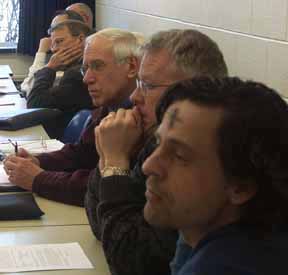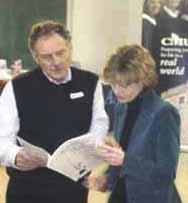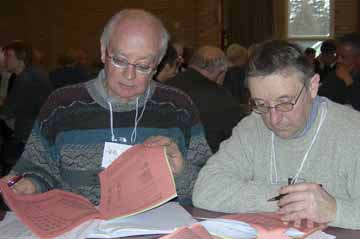Canadian Mennonite
Volume 11, No. 06
March 19, 2007

Pastors learn of ‘emerging church’ phenomenon
Waterloo, Ont.
 |
Pastors attending the Mennonite Church Eastern Canada School for Ministers last month stepped right into an “emerging worship” experience as they descended the stairs of the Great Hall at Conrad Grebel University College—an experience anything but typical for many of the more than 120 registrants.
Three large video screens located on different walls of the hall simultaneously presented different visual calls to worship—scenes of people from everyday life around the world on one, people of different faiths at worship on another, and a portrayal of the story of creation from Genesis 1 on a third—as participants found their seats in chairs strewn about the room in no discernable order. As if this wasn’t enough audiovisual stimuli, the story of Paul at the Areopagus in Acts 17 was shouted over the din of the room.
All this was to emphasize a theme for the first morning: Restlessness is as much a part of the world today (as experienced in the rather chaotic encounter in the Great Hall), as it was at the beginning of creation and in the culture Paul encountered in Athens.
This set the stage for keynote speaker Reginald Bibby, a noted Canadian demographer, who later presented a lecture borne out of his research called “Restless Gods and restless churches.” But for the remainder of this first part of the morning, contemporary songs led by a worship band and an adapted form of St. Ignatius’ examen focused participants on a very personal experience of restlessness.
Over the three days, ministers experienced first-hand the types of innovations many emerging churches are applying to their worship. Skilled musicians on electric instruments combined popular and secular music with classic hymns to show how a diverse mixture of music can bring many people to common places of worship. Projected images—combining still jpeg files and captured video—were offered as examples of engaging worshippers through the visual senses. And invitations to draw on wall-mounted papers, to come forward to receive ashes (on Ash Wednesday), or to meander about the room to one of several “communion stations” were offered as ways for people to participate physically in literal movements of corporate worship.
Afternoon workshops gave pastors the opportunity to further immerse themselves in various expressions of the emerging church within MC Eastern Canada.
Jim Loepp Thiessen described his recent journey of launching The Gathering, a new church in Kitchener, Ont. His “One direction in religion’s renaissance” workshop addressed some of the energies and innovations involved in a church’s commitment to being a vital presence in its immediate neighbourhood.
Anne and Dave Campion offered the model of Soulspace, an emerging worshipping community in Stratford, Ont., as a window on how the uses of many forms of imagery and personalized interaction in worship can draw people into fuller awareness of God in the midst.
Brice Balmer, chaplaincy director with the House of Friendship and author of Meeting our Multifaith Neighbors, challenged participants to seek out opportunities for interfaith connections and cross-cultural relationships as Canada’s urban centres become increasingly diversified with people of all faiths and ethnicities.
Bev Suderman-Gladwell and Margaret Andres showed participants how Waterloo North Mennonite Church implemented a Logos program, a weekly retreat experience to build relationships between generations of the congregation.
Area church hears ‘call to covenant’
Chilliwack, B.C.
 |
Mutual relationships and covenants were the overarching theme when Mennonite Church B.C. delegates met last month at Eden Mennonite Church for their annual meeting. With an eye to the upcoming provincial joint covenant signing later this spring, “Call to covenant” was the theme chosen for the sessions.
“In any covenant relationship, it’s not about ‘my way.’ Covenant today is about God’s will for us,” said moderator Gerd Bartel in his opening remarks.
Conference minister Henry Kliewer also talked about the importance of covenant. “The concept of covenant is as old as the Bible itself,” he said. “It comes with both a vertical and horizontal dimension. Keep on thinking about your part in covenant-making with your God and also in your church.”
The LEAD (Leaders, Elders and Deacons) conference the previous day also focused on the meaning of covenant. MC Canada conference minister Sven Eriksson and Eben-Ezer Mennonite pastor Artur Bergen led the sessions and gave opportunity for individuals to share how they respond to the call of God in their lives.
The main agenda item for the annual delegate session was the Steering Committee report regarding the MC B.C. covenant. The covenant had been through several drafts and even on Feb. 24 generated more discussion. But by a vote of 148-12, the delegates approved the wording of the covenant as presented, which is to be signed and celebrated at a May 27 worship service. The covenant involves local congregations’ mutual relationship within MC B.C. and covers six areas of commitment to:
• Essential doctrine and practice;
• Meaningful worship and fellowship;
• Shared ministries;
• Discernment;
• Mutual accountability; and
• Service.
“The 93 percent approval was an answer to prayer and a movement of the Holy Spirit among us,” Bartel commented later. “The tone set by the worship team at the start of the meeting moved the congregation to a spirit of unity.”
The organizational chart that is to govern a renewed MC B.C., which outlines relationships between congregations, leadership and committees, was also approved, as was a motion on priority actions in the mission of MC B.C.
Delegates also approved the financial statement and budget, and held roundtable discussions about the vision for Camp Squeah’s future and how the camp can best serve its constituents of all ages. As well, they heard input from the Evangelism and Church Development Committee on its latest programs, including Wellspring Christian Fellowship’s new coffeehouse ministry.
A motion to include only pastors on the Faith and Life Committee was defeated.
One highlight for many was hearing the church mini-reports interspersed throughout the business sessions. Individuals from several congregations, including First Mennonite of Greendale, Crossroads Community Church of Chilliwack and First Mennonite of Kelowna, shared how God is working in their congregations, then they were prayed for by a member of another congregation. Some ministries mentioned include the Alpha program, overseas mission trips or practical help to local people in need.
Prior to beginning morning and afternoon business sessions, Eden youth pastor Rob Brown and a team of musicians led the group in turning their thoughts toward God through hymn and chorus singing.
The day concluded with a commissioning service led by Kliewer for those beginning or continuing service on committees, while recognizing those who have completed their terms of service.
Manitoba delegates speak on church survey and camp concerns
Winnipeg
 |
“Living on the edge” is what many of the 172 delegates—out of a possible 361—may have felt as they braved the unpredictability of a Manitoba winter to attend the 60th annual delegate sessions on Feb. 23 and 24 at Bethel Mennonite Church. They represented 42 out of Mennonite Church Manitoba’s 49 congregations.
Guest speaker Len Hjalmarson, a writer from Kelowna, B.C., said churches too often are rigid and hard around the edges while being uncertain about what is their centre. He used the illustration of a visitor to the Australian outback asking a rancher how he kept track of his cattle. “Out here, we dig wells instead of building fences,” was the reply. “Instead of building walls or fences, [churches] need to sink wells,” Hjalmarson said.
Over the past year MC Manitoba conducted a survey of its congregations, to learn more about their health and to discern issues for the future. Delegates spent their largest block of time discussing the four major issues the survey identified: dealing with conflict and change; youths and the church; leadership development; and responding to our cultural context.
Lively discussion among breakout groups indicated that these issues are major concerns for MC Manitoba congregations, but delegates had a difficult time turning their discussions into a single action item to report back to the group—the statements that resulted were quite general as a result.
At the end of the day, delegates approved a motion to “continue these discussions as an MC Manitoba body to positively and creatively respond to the dynamic changes that are impacting our culture and the church. We affirm the direction statements as presented at the 2007 [annual delegate sessions] and that they be referred to the MC Manitoba board for further discussion and development.”
Morning roundtable discussions about increased honorariums for summer camp staff and regional camp committee accountability structures resulted in the delegates handing these issues back to the board. “I don’t think we are well enough informed,” said Albert Bergen of Crystal City Mennonite Church. Some expressed frustration at being asked to decide on specifics of camp management. “We are dealing with much bigger issues in our churches and here we spent a morning talking about camp management,” said one delegate.
Delegates also attended four morning workshops on evangelism, pastoral reviews, art in the church and the congregational life cycle.
At the end of the gathering, two youth pastors stayed back to reflect on the sessions. Kyle Penner of Springfield Heights Mennonite Church, Winnipeg, and Dale Friesen of Morden Mennonite Church puzzled over the perennial question of how to attract young people.
“I have too many young people who want to use their holiday time to serve on Matheson Island, but they don’t want to come here,” said Penner. “We like conferences because of the opportunity to meet people and to talk about ideas, but I struggle with what is the role and the meaning of this, who this is for and what this accomplishes. The conference should be a place where we can do things together that we can’t do alone.”
(For more annual delegate session news, see the MC Manitoba report in TheChurches. Ed.)